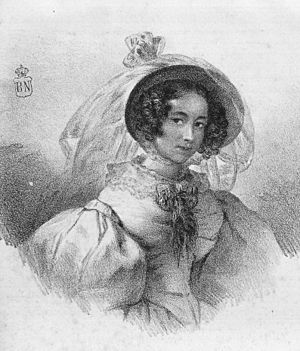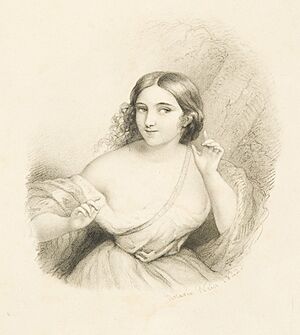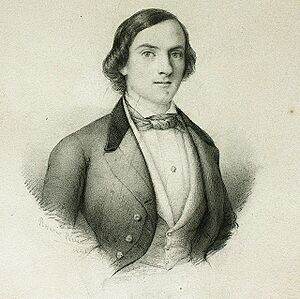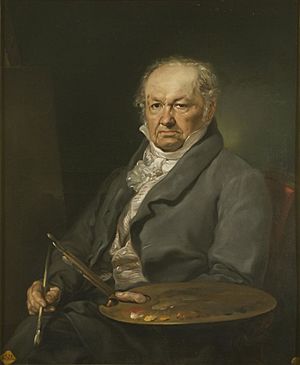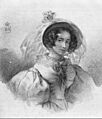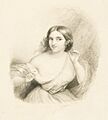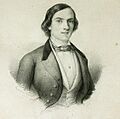Rosario Weiss Zorrilla facts for kids
Maria del Rosario Weiss Zorrilla (born October 2, 1814 – died July 31, 1843) was a talented Spanish artist. She was known for her beautiful portraits and engravings. Rosario was the goddaughter of the famous painter Francisco de Goya. She even lived with him during his last years.
Many of her drawings were once thought to be Goya's work. More than seventy of her drawings are kept at the Hispanic Society of America. In 1956, an art expert named José López-Rey proved they were actually Rosario's. This showed how skilled she was!
Contents
Early Life and Artistic Training
Rosario Weiss Zorrilla was born in Madrid, Spain. Her mother was Leocadia Zorrilla. Rosario started learning to draw and write when she was just seven years old. Her teacher was none other than her godfather, Francisco de Goya.
She continued to study with Goya until she was fifteen. After that, she learned from an architect named Tiburcio Pérez. Later, when Goya moved to Bordeaux, France, Rosario studied with a local artist who designed wallpaper.
Studying Art in France
Goya wanted Rosario to get the best art education. He even thought about sending her to Paris. This plan did not work out. So, in 1827, she began studying with Pierre Lacour. He was a well-known art teacher in Bordeaux.
Return to Spain and Career
After Goya passed away in 1828, Rosario and her mother returned to Spain. This was in 1833, after a special pardon allowed people who had left the country to come back. Once in Spain, Rosario used her art skills to help her family.
Becoming a Copyist and Exhibitor
Rosario earned money by making copies of famous paintings. She copied works by the Old Masters at the Museo del Prado. These are very old and important paintings. She also copied art at the Real Academia de Bellas Artes de San Fernando. She showed her own art in exhibitions there too.
In 1840, the Academia recognized her talent. They named her an "Academician of Merit." This was a big honor for an artist.
Royal Art Teacher
That same year, Rosario got a very important job. She became the drawing teacher for the young princesses, Isabel and Luisa Fernanda. She earned a good salary of 8,000 reales for this position. Friends of her brother, Guillermo, helped her get this job.
Other Artistic Contributions
Rosario was not just a painter and copyist. She also worked as an illustrator. She created drawings for a book called Isla de Cuba pintoresca by Manuela de Andueza. This shows her versatility as an artist.
Later Life and Legacy
Rosario Weiss Zorrilla died suddenly when she was only twenty-nine years old. A report from the royal doctor suggested she had a severe reaction to seeing a violent protest. This happened when she was leaving the Royal Palace of Madrid.
However, an obituary written by a friend of her brother said she died from an intestinal infection. This was likely cholera, a serious illness at the time. Rosario's short life ended too soon, but her artistic contributions are still remembered.
Works in Collections
Many of Rosario Weiss Zorrilla's artworks are kept in museums and libraries in Madrid. You can find her paintings, drawings, and lithographs in places like:
- The National Library of Spain
- The library of the Royal Spanish Academy
- The Lázaro Galdiano Museum
- The Royal Academy of San Fernando
- The Museum of Romanticism
In 2014, the Museo del Prado bought one of her drawings. They also acquired her copy of a painting by Rafael Tegeo Díaz. This shows that her work continues to be valued today.
Images for kids
See also
 In Spanish: Rosario Weiss Zorrilla para niños
In Spanish: Rosario Weiss Zorrilla para niños
 | Sharif Bey |
 | Hale Woodruff |
 | Richmond Barthé |
 | Purvis Young |


